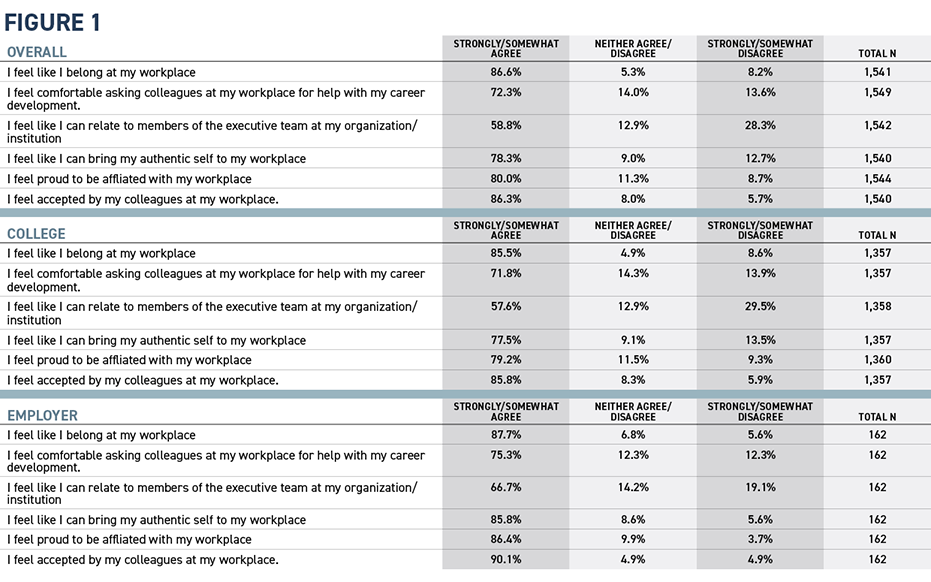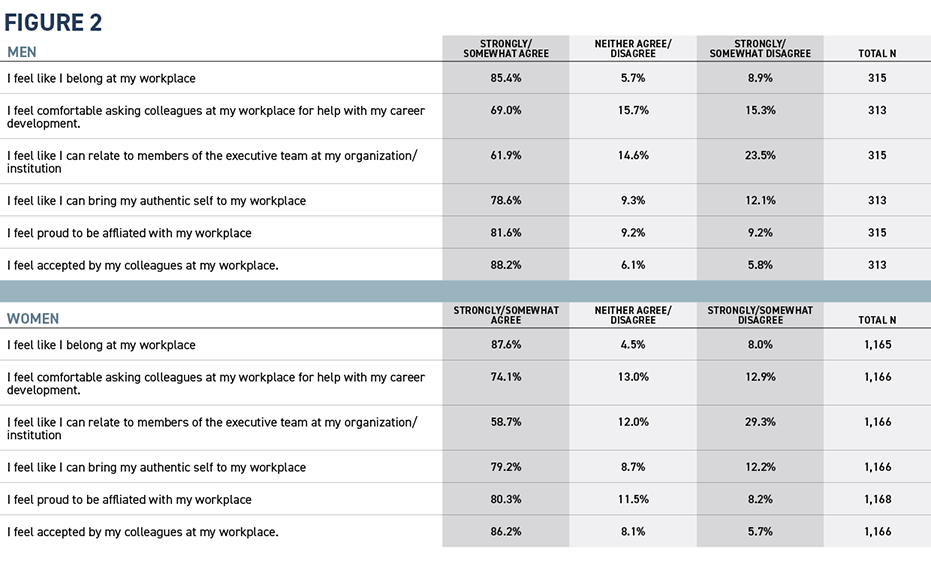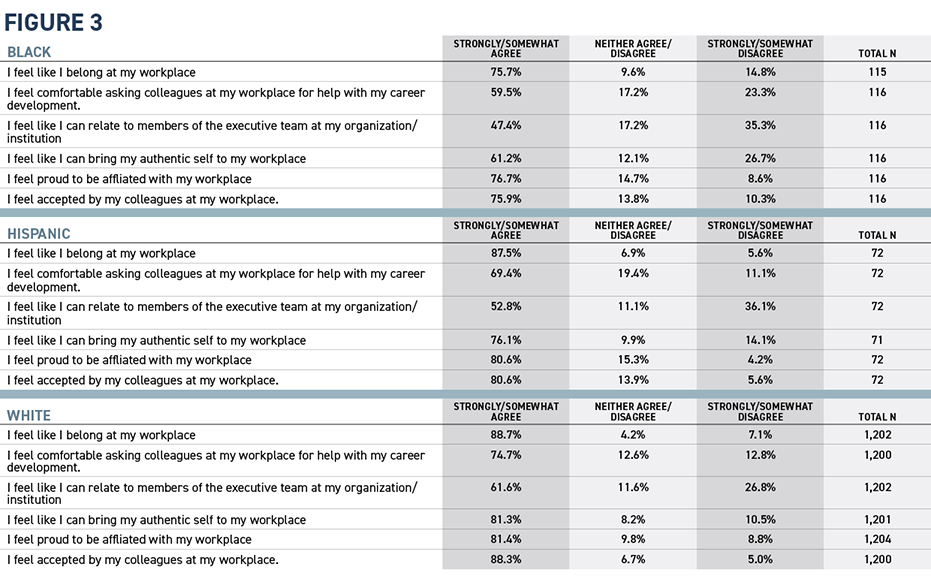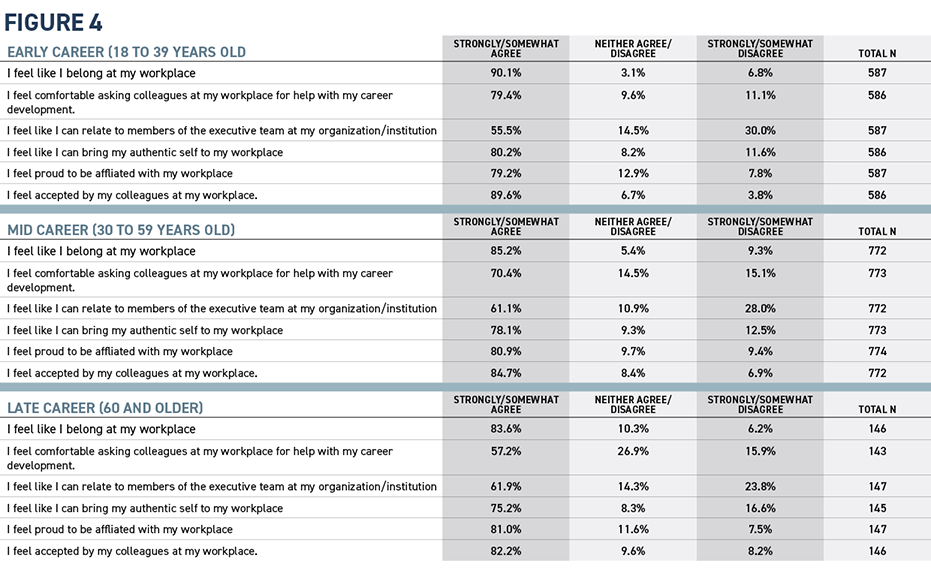Belonging at work—feeling that one is valued, accepted, and supported—helps to ensure a healthy, productive, and positive work environment. However, a sizable portion of U.S. workers do not feel a sense of belonging in their workplaces. The 2023 American Association of Psychology Work in America Workforce Survey found that 30% of respondents felt that their workplace doesn’t support them because of their identity, and one in five workers somewhat/strongly disagreed with the statement “When I’m at work, I feel like I belong.”
In winter 2024, NACE surveyed its membership to better understand their experiences with belonging in the profession. We found, overall, that the vast majority of (87%) of respondents—college (86%) and employer (88%) members—strongly or somewhat agreed with the statement “I feel like I belong at work.” Furthermore, 90% of employer members and 86% of college members felt accepted by colleagues at their workplaces.
Yet, despite the high percentage of respondents who reported they feel accepted by colleagues, much smaller percentages (72% of college members and 75% of employer members) felt comfortable asking a colleague at their workplace for help with their career development. This indicates that despite a culture of belonging in many workplaces, conversations around career development and pathways in the workplace appear less common.
Most respondents (80%) report that they are proud to be affiliated with their workplace, and 78% report that they can bring their authentic self to the workplace. Interestingly, employer members tended to be more in agreement with these statements than were college members. (See Figure 1.)
However, despite high levels of agreement around belonging in the workplace, just 59% of respondents strongly/somewhat agree with the statement that they can “relate to members of the executive team at their organization/institution.” Looking across membership type illustrates a similar pattern as noted earlier—where employer members (67%) are more likely to agree with the statement than college members (58%). This finding is particularly concerning when we look at the percentages of members who strongly/somewhat disagreed with the statement—30% of college members and 20% of employer members. These sizable percentages of members who reported that they did not relate to leadership at their workplace can lead to long-term morale and workplace culture challenges.
Belonging by Demographic Groups
Looking more deeply into our data, we find interesting patterns across race, gender, and age demographic groups. First, there is little difference in the percentages of men and women who report that they belong in, are proud to be affiliated with, can bring their authentic self to, and feel accepted by their colleagues in the workplace. However, we do see gender differences in the other measures. While close to three-quarters (74%) of women report that they feel comfortable asking colleagues in their workplace for help with their career development, 69% of men strongly/somewhat agreed with that statement. Meanwhile, 62% of men reported that they could relate to members of the executive team, compared to 59% of women. (See Figure 2.)
In regard to race and ethnic differences, while 89% of white respondents and 88% of Hispanic respondents strongly/somewhat agreed with the statement that they felt like they belonged in the workplace, slightly over three-quarters (76%) of Black respondents did. Moreover, 15% of Black respondents strongly/somewhat disagreed with the statement, as compared to 6% of Hispanic and 7% of white respondents. Similar patterns appeared of Black workers more strongly disagreeing with several other measures of belonging than do other groups.
However, two measures of belonging are particularly interesting to examine across racial and ethnic groups. When asked about relating to leadership at their organization, 62% of white respondents, 53% of Hispanic respondents, and 47% of Black respondents strongly/somewhat agreed that they could relate. And a sizable percentage of Black (35%) and Hispanic (36%) respondents reported that they strongly/somewhat disagreed with the statement. Similarly, when asked about being able to bring their authentic self to the workplace, 27% of Black and 14% of Hispanic respondents strongly/somewhat disagreed with the statement. (See Figure 3.)
When we look across ages of respondents, while on many of the measures there were little differences, respondents who were early in their career (18 to 39 years old) are slightly less likely to agree with the statement that they can relate to members of the executive team of their organization/institution, as compared to mid-career and late-career respondents. Late-career respondents were less likely than other groups to agree with the statement that they are comfortable asking colleagues at the workplaces for help with their career development. This may be in part because those individuals are closer to retirement than other groups. (See Figure 4.)
The racial and gender differences highlight that, while overall belonging rates appear high in the field, there are key differences among groups. Furthermore, even with high levels of belonging on many measures, less than three-fifths of respondents could relate to leadership at their organization. For many minoritized groups, those portions are even less. Our findings indicate that deeper dives into belonging, particularly across different groups, will help to better understand workplace culture and ensure that all career services and university recruiting professionals can thrive.
The NACE Quick Poll on belonging was sent to 15,024 NACE members and included measures of belonging in the workplace. The survey was fielded from February 20 to March 15, 2024. NACE received 1,727 responses, of which 87.6% were from college members, 11% were from employer members, and 1.4% were from other types of members.










